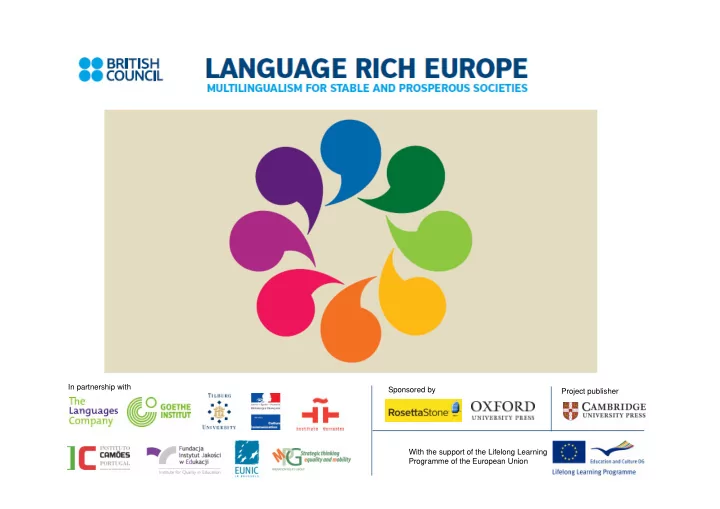

In partnership with Sponsored by Project publisher With the support of the Lifelong Learning Programme of the European Union
What is Language Rich Europe? Language Rich Europe is a networking project which brings together 1200 policy makers and practitioners from 24 countries and regions in Europe to discuss and develop better policies and practices for multilingualism. Network members are drawn from the fields of education, business, public services and the media.
Who is involved? What are their roles? • Co-financed by the European Commission under its Lifelong Learning Programme • Initiated by the British Council, the UK’s international organisation for educational opportunities and cultural relations • Managed by the British Council, and supervised by a Steering Group made up of representatives of over 30 partner organisations • Contribution of funding, services and expertise from Language Rich Europe project sponsors
What are the Project Objectives? • To facilitate the exchange of good practice in promoting intercultural dialogue and social inclusion through language teaching and learning • To promote European cooperation in developing language policies and practices across several education sectors and broader society • To raise awareness of the European Union and Council of Europe recommendations for promoting language learning and linguistic diversity across Europe
Why Language Rich Europe? 84% of Europeans believe that people should be able speak more than one language.* 83% of European businesses use language skills as a factor in recruitment.** 44% say of Europeans say they cannot hold a conversation in another language.* * ( Eurobarometer ) **( Language Rich Europe ) In a globalised world with increasing levels of migration, being able to speak more than one language has never been so important: • to enhance job prospects for individuals, • to foster intercultural understanding and social cohesion • to increase Europe’s competitiveness
What does Language Rich Europe Do? LRE provides a commentary on current language policies and practices in participating countries/regions. Research and Analysis Trends in Language Policies and Practices in Europe The project conducted an analysis of language policies and practices in Europe, comparing them to EU and CoE standards. Consultation Now stakeholders are coming together in a series of over 80 interactive events across Europe to share knowledge and good practice in multilingualism. This will result in concrete, evidence-based recommendations for decision makers at country and European level
The Research: Who is involved? • Research led by the Babylon Centre for Studies of Multicultural Society at Tilburg University • Data complemented by research partners in each country who provided their own analysis of the findings, supported by examples of good practice and promising initiatives
The Research: Draft Framework and Indicators • Tool for self- evaluation of policies and practices against EU documents • Desire to trigger follow-up research • Interest in comparing findings with other studies
The Research: Language Types • National languages : Official languages of a nation-state • Foreign languages : Languages that are not learnt or used at home but learnt and taught at school or used as languages of wider communication in non- educational sectors • Regional or minority languages: Languages that are traditionally used within a given territory of a state by nationals of that state who form a group numerically smaller than the rest of the state’s population • Immigrant languages: Languages spoken by immigrants and their descendants in the country of residence, originating from a wide range of (former) source countries
The Research: Language Domains • Languages in official documents & databases • Languages in pre-primary education • Languages in primary education • Languages in secondary education • Languages in further and higher education • Languages in audiovisual media & press • Languages in public services & public spaces • Languages in business
The Research: Sample used for each domain Further and higher education • 69 VET institutions and 65 universities Public services and spaces • 63 cities Business • 484 companies in 4 sectors: banks, hotels, supermarkets and construction
The Research: Countries Surveyed 1. Austria 10. Lithuania 2. Bosnia & Herzegovina 11. Netherlands 3. Bulgaria 12. Poland 4. Denmark 13. Portugal 5. Estonia 14. Romania 6. France 15. Spain 7. Greece 16. Switzerland 8. Hungary 17. Ukraine 9. Italy 18. United Kingdom
The Research: Regions Surveyed Spain 1. Catalonia United Kingdom 2. Basque Country 4. England 5. Wales Netherlands 6. Scotland 3. Friesland 7. Northern Ireland
The Research: Regions Surveyed Spain 1. Spain (Madrid, Sevilla, Valencia) 2. Catalonia 3. Basque Country
Pre-Primary Secondary Primary LRE circles
Universities Media VET LRE circles
LRE circles – cities Strategies How widespread? How many languages Oral and written communication How many languages?
What has happened so far? November 2010 – April 2011 • Design and piloting of questionnaire April 2011 – September 2011 • Research conducted in 24 countries/regions September 2011 – April 2012 • Analysis and writing up of data, translation into 23 languages May – June 2012 • Publication of “draft for consultation” document and initial discussion with stakeholders
What happens next? September – November 2012 • Follow-up national workshops with stakeholders to discuss findings of survey December 2012 • First international conference in London and publication of project findings and good practice January 2013 • National workshops to develop recommendations at national and European level March 2013 • Final conference in Brussels to present recommendations to EU institutions
How can you get involved? • Join the LRE network in you country – join the conversation • Participate in the national workshops • Promote multilingualism in your area of work/life
Recommend
More recommend